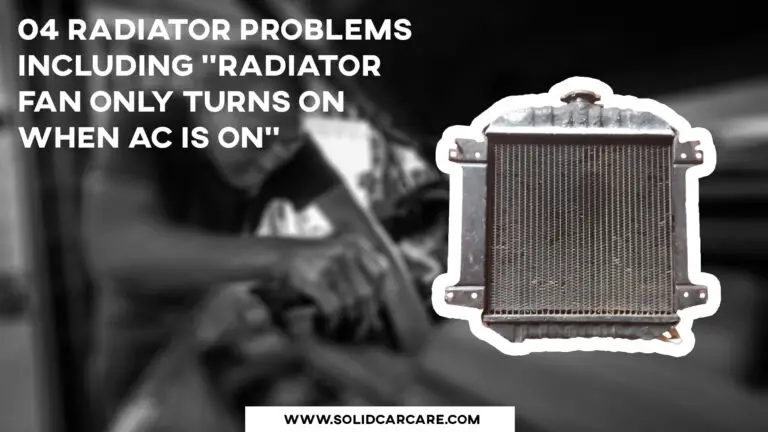Car AC smells like Vinegar : Causes and How to fix it?

You may detect your Car AC smells like Vinegar. You might not understand why the stench is there or why it smells like rotten eggs or a body odor. If you think whether AC smells like Vinegar is dangerous, the answer is, it is not harmful. Get rid of the vinegar smell in the car is easy. When you run the air conditioner to cool down the cabin, you may notice that the pungent odor becomes even stronger. What can you do if your car’s AC smells like Vinegar? Start by turning off the air conditioner to see whether the stench persists. If the odor goes away, it’s a clue that there’s a problem with the air conditioner.
Fungus, bacteria, and mold growth when water collects in the drip lines or ducts, finally producing the stale odor you receive from your air conditioner. The odor isn’t always vinegary; it might also smell like mildew, crayons, burnt plastic or oil, sour milk, dirty socks, or rotten eggs. While most of these noxious odors are harmless, others might be harmful to your health. So, regardless of the odor, it’s essential to look into the root of the problem. It may help to get rid of Vinegar. If the odor persists after cleaning or replacing the A/C components, seek help from a skilled mechanic.
Table of Contents
- Causes of Car AC smells like Vinegar?
- 1. Filthy Duct work or Air Vents
- 2. Excessive Condensation
- 3. Overflowing Condensate Pan
- 4. Air Filter that is dirty or clogged
- 5. Evaporator Coil and Fins Moldy
- 6. A Catalytic Converter That Isn’t Working
- 7. Filter that has become clogged with fuel
- 8. Fuel Pressure Sensor Fault
- 9. Transmission Fluid (Old)
- 10. Buildup of organic materials
- How can we get rid of your Car AC smells like Vinegar?
Causes of Car AC smells like Vinegar?
1. Filthy Duct work or Air Vents
Mold appears out of nowhere. In order for an infestation to occur, your vehicle would need to be in a warm environment with a lot of water vapor. This means that drivers in sunny Florida are more likely to have moldy vents and ducts. However, if the temperature or season changes – usually from winter to spring – your car may face the same fate.
Simply said, when there is a lot of water vapor in the air, your car may wind up accumulating water droplets instead of evaporating them. When dust and debris (including leaves and pollen if you drive with your windows down) are mingled inside the air vents, mold or mildew develops, causing the air coming out of your AC unit to smell acidic or vinegary.
“Why does my car AC smells like Vinegar?” you might wonder. When you get inside your automobile, it’s clear that your HVAC system setup to par. However, there are also other signs that may cause you to believe you have a mold problem:
Once you turn on the air conditioner in your wheeler, it irritates your nose, throat, and eyes.
Symptoms of allergies include watery eyes, rashes, and a runny nose.
When I step into the automobile, I have unexplained headaches.
Fatigue, nausea, and dizziness are only experienced when riding a specific vehicle.
Mold can be seen growing in the air ducts, condensate pans, and intake vents.
2. Excessive Condensation
Excess condensation occurs when the condensation pan in your automobile overflows and leaks water. This problem should not affect you if your air conditioner and condensate drainage system are in good functioning order. Otherwise, water drippings may overflow the pan, and dampness will accumulate on your vehicle’s ceilings and walls (even in the trunk and spare-tire casings in some cases). A clogged drain owing to algae, a burnt-out pump, a rusty condensation pan, a dirty air filter, and a loose/broken drain line are all certain to produce excess condensation in your air conditioning system.
3. Overflowing Condensate Pan
Condensate formed from warm air traveling through the evaporator coils is caught in the condensate pan. The water drips into the PVC condensate drain pipe, which is subsequently sent outside your vehicle cabin. Collecting water droplets that did not evaporate run down from the air handler via your ceiling, walls, and car floors if the condensate pan gets damaged, corroded, or obstructed. When you operate your air conditioner, this moisture creates an unpleasant vinegar odor.
4. Air Filter that is dirty or clogged
Perhaps the second most common cause of that musty, dingy odor inside vehicles is a dirty air filter. Not only do air filters become filthy quickly, but it’s also simple to forget to replace them when they’re needed. Moisture can easily build up in the filters, especially if the user lives in an area with a hot, humid climate or uses their air conditioner frequently.
Mechanics and car owners are familiar with the two most common filter cleaning methods: “beating” and “blowing out.” However, they aren’t necessarily the most effective cleaning procedures.
5. Evaporator Coil and Fins Moldy
Unlike the other reasons on this list, which derive from excessive or incorrect usage of one’s car, this one stems from extended periods of inactivity. Dust, grime, and (most crucially) moisture can collect on the evaporator coil and fins if your daily commuter is left in the garage for too long. When this happens, the aforementioned components become a breeding ground for mold.
Long before you smell that vinegary stench inside your car, there are tell-tale signals that you should inspect your evaporator coils and fins. If your air conditioner breaks down regularly, you have to change your filter frequently, or you notice an odd battery drain, your coils and fins have likely developed a significant amount of mold.
6. A Catalytic Converter That Isn’t Working
In some circumstances, instead of using household vinegar, your vehicle will emit a different odour. If this happens to you, know that it’s because of your car’s emissions system, notably the catalytic converter (see on Amazon). Its goal is to reduce hazardous emissions by converting hydrogen sulfide (a gas produced by your car) into innocuous gases such as sulfur dioxide. This step is skipped if your catalytic converter is faulty or damaged.
7. Filter that has become clogged with fuel
A gasoline filter is your vehicle’s first line of defense against dirt and rust particles that can cause engine damage or premature component wear and tear. Aside from that, it collaborates with your car’s fuel pressure sensor and catalytic converter to ensure that bad gas emissions are kept to a minimum. It aids the converter in converting small amounts of hydrogen sulfide compound in fuel into a harmless, odorless form when it is in mint condition. However, as the gasoline filter wears down, it fails to screen contaminants, resulting in an influx of sulfur deposits that cause the catalytic converter to burn.
8. Fuel Pressure Sensor Fault
The fuel pressure sensor, in conjunction with a properly maintained fuel filter, regulates fuel consumption in automobiles and prevents the catalytic converter from overheating or being clogged with oil. If this sensor fails, the converter will not be able to handle all of the exhaust byproducts that leave via the tailpipe. Instead of odorless, innocuous gases, the result is the distinct stink of rotting eggs.
9. Transmission Fluid (Old)
Stale transmission fluid considers as the simplest and easiest to fix of all the various sources of offensive odors within your vehicle. If you don’t get your transmission flushed on a regular basis, the old transmission fluid leaks into other car components, giving off a rotten egg odor. While electric vehicles are spared from this issue, fuel-fed manual vehicles require regular inspection and careful attention to maintenance schedules.
10. Buildup of organic materials
If you do a number of off-roading with your vehicle, dead animals will get lodged in your air ducts. When coupled with water droplets inside the HVAC system, animal corpses, like dirt and detritus, contribute to mold formation. The frequency of the odor is determined by the compartment in which the dead animal is located and whether or not it is decomposing. The stink will be at its worst if it’s close to the blower. The odor diminishes as the animal decomposes.
How can we get rid of your Car AC smells like Vinegar?
The simplest approach to get rid of the vinegar smell in your car’s air conditioning is to take it to a reputable repair, such as the team at Auto Truck Service Inc. Your local technician or repair shop may look at your car’s air conditioner to see whether it’s the root of the problem and then fix it—whether that requires digging out decaying plant debris or simply replacing the air filter.
If the scent isn’t coming from your air conditioner, your mechanic will rule it out and look for other causes. Taking your automobile to the shop can save you time, money, and aggravation in the long run. While many people are confident in their ability to change an air conditioner filter, fewer are aware of what to do if the filter does not cure the problem. Taking your vehicle to a professional removes the guesswork—and the risk of damaging your vehicle while attempting to repair it.






